A small loss of water can really slow you down. This shows how key hydration is for those who are always on the move. Drinking enough water helps you stay strong, supports your muscles, and keeps your body cool. As someone who’s always active, it’s important to focus on staying hydrated.
Being hydrated is a must for anyone who loves to stay active. This could be you, whether you’re a pro athlete or just starting out. In this article, we’ll share important tips on staying hydrated and how to fuel your body for peak performance. We’ll cover how to stay hydrated before, during, and after you exercise.
Key Takeaways
- Proper hydration is essential for physical performance and overall health
- Active individuals should prioritize hydration tips and electrolyte balance
- Daily hydration goals vary based on individual factors, such as weight and physical activity levels
- Water intake is crucial, aiming for at least 8-10 glasses of water per day
- Incorporating hydrating foods, such as watermelon and cucumbers, can contribute to daily hydration needs
- Avoiding caffeine and alcohol can help prevent dehydration
- Staying hydrated is vital for regulating body temperature and supporting muscle function
Importance of Hydration for Active Lifestyles
For those who are always on the move, staying hydrated is key. It helps control body temperature, moves nutrients, and gets rid of waste. Dr. Eby says not having enough water can make blood thicker and less efficient at carrying oxygen. This can lower your athletic performance, make you tired, and increase injury risk.
Being well-hydrated is vital for fitness hydration and workout recovery. Even a little dehydration can cause headaches and lower your performance. But, drinking enough water helps keep blood pressure right, improves blood flow, and gets oxygen and nutrients to muscles. It also helps manage fluid retention, which is important for health and sports performance.
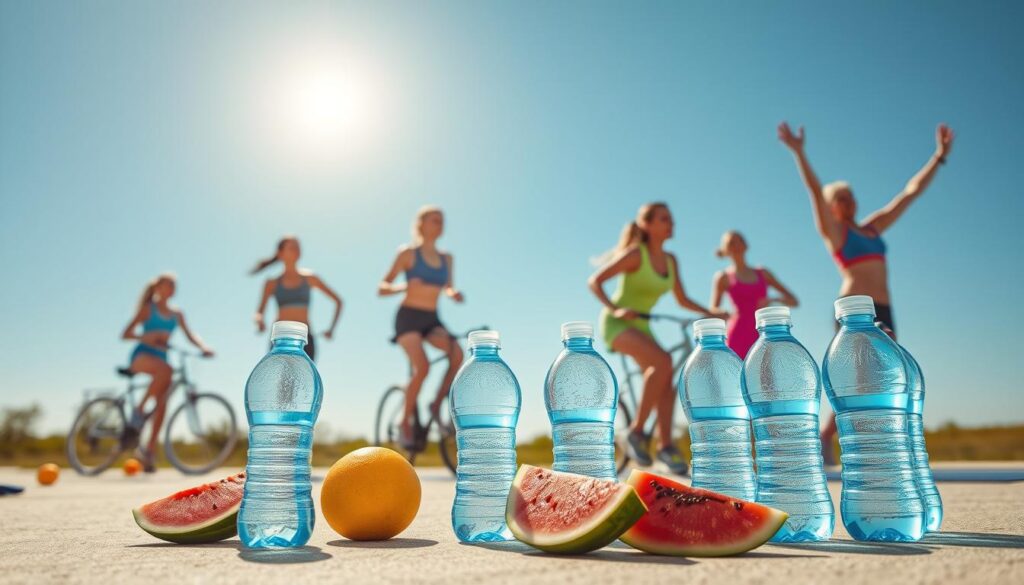
For athletes, drinking ½ to 1 ounce of water per pound of body weight each day is recommended. During exercise, aim for four to six big gulps of water every 15 to 20 minutes. After working out, drink 24 ounces of water for every pound lost to rehydrate. Knowing how much you sweat is also important. You can figure this out by weighing yourself before and after a workout.
The Science Behind Hydration
The science of hydration is complex, but it’s clear it’s crucial for athletes and overall health. By understanding hydration’s importance and staying hydrated, you can boost your performance, lower injury risk, and support your health.
How Dehydration Affects Performance
Dehydration can really hurt your athletic performance. It can make you less strong, less fast, and less able to last long. Even a 2% dehydration level can hurt your sports performance. So, it’s important for athletes to drink plenty of water before, during, and after exercise to stay hydrated.
Daily Hydration Goals for Active Individuals
Staying hydrated is key for those who are active. It boosts energy and performance. The Institute of Medicine suggests that adult women need about 91 ounces of fluid daily. Adult men should aim for 125 ounces.
But, how much water you need can change. It depends on your age, sex, weight, and how active you are.
Thinking about fitness nutrition and water intake is important. The U.S. National Academies suggest men drink about 15.5 cups (3.7 liters) of fluids daily. Women should aim for 11.5 cups (2.7 liters). About 20% of this comes from food, and the rest from drinks.
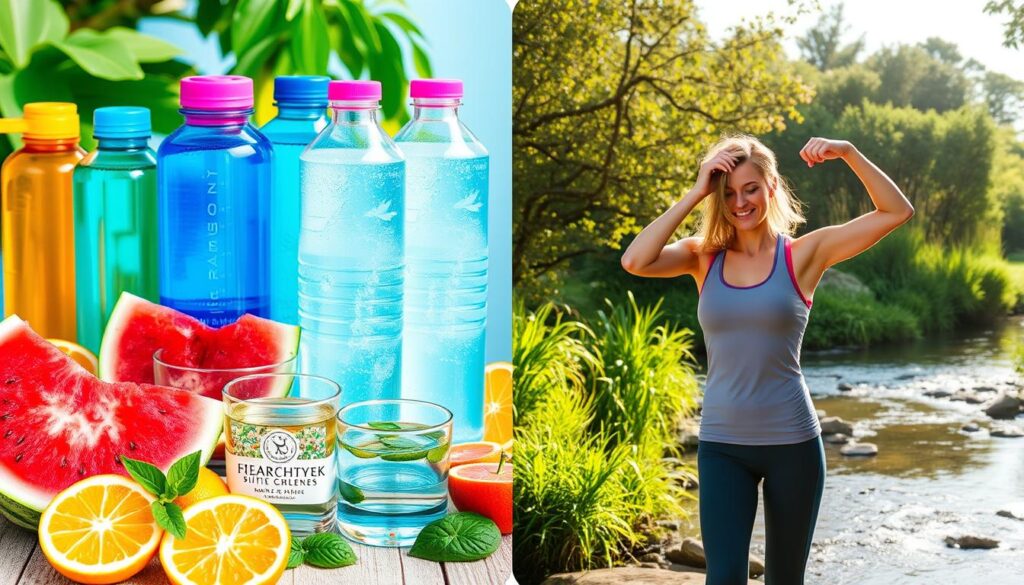
Factors Influencing Water Needs
Many things can affect how much water you need. Exercise, the weather, and your health are examples. Athletes might need more water during long or intense workouts. People with conditions like diabetes or heart disease might also need to drink more.
Tailoring Intake for Different Activities
It’s important to adjust your water intake based on your activities. For instance, those doing high-intensity activities like running or cycling might need more water. People doing low-intensity activities like walking or yoga might need less.
Checking your urine color can also help. If it’s pale and clear, you’re likely well-hydrated.
By understanding what affects your water needs and adjusting your intake, you can stay hydrated. This supports your fitness goals and keeps your energy up.
Choosing the Right Beverages
Choosing the right drinks for healthy hydration is key. With so many options, picking what to drink can be tough. For those doing intense activities, sports drinks might be the best choice. Dr. Eby suggests athletes use sports drinks for workouts over 45 minutes.
Other drinks like coconut water and herbal teas also help with staying hydrated. Coconut water is full of electrolytes, great for after working out. Herbal teas are a calm, low-calorie option.
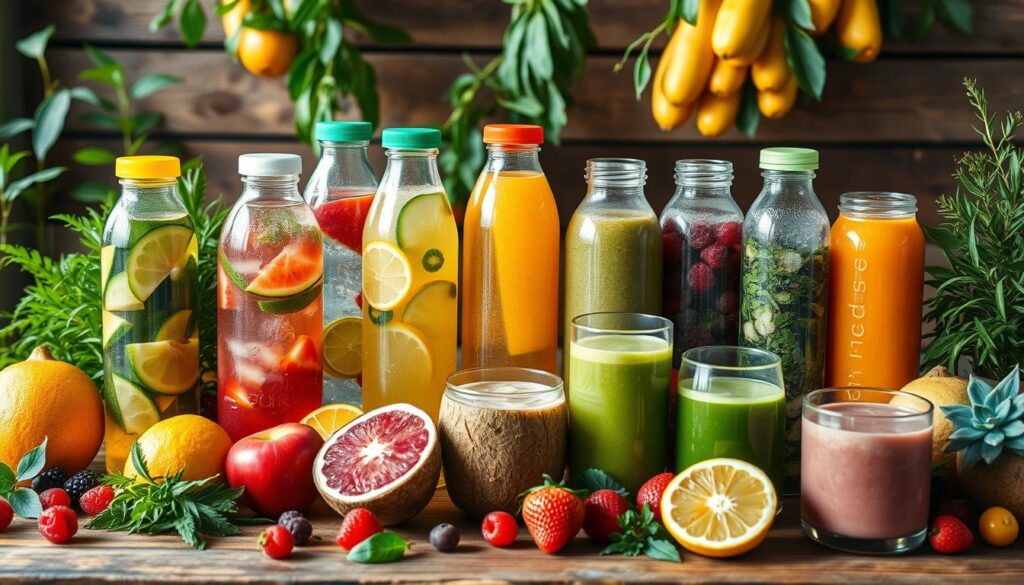
Think about how active you are and what you need when picking a drink. For light to moderate activities, water or herbal teas work well. But for intense activities, sports drinks or coconut water help replace lost electrolytes.
The best way to stay hydrated is to listen to your body. Choose drinks that fit your needs. This way, you’ll stay hydrated and perform well.
Hydration Tips Before Exercise
Drinking enough water before exercise is key for top performance. Dr. Eby suggests drinking 17 to 20 ounces of water a few hours before. This keeps your body temperature right, blood volume steady, and joints lubricated.
Eating foods that help with hydration is also smart. Watermelon and cucumbers, for example, are full of water. Think about your metabolic health when you plan your hydration.
Preparing for Workouts
Drink water all day to get ready for workouts. Try to have 6-8 ounces every 20 minutes while you’re active. Electrolyte-infused waters can also help keep you hydrated and replace lost minerals.
Foods that Boost Hydration
Some foods are great for staying hydrated. Here are a few:
- Watermelon: 92% water content
- Cucumbers: 96% water content
- Strawberries: 91% water content
These foods can help meet your daily hydration needs. They also support your metabolic health. By following these tips, you can enhance your physical performance and aid in gym recovery.
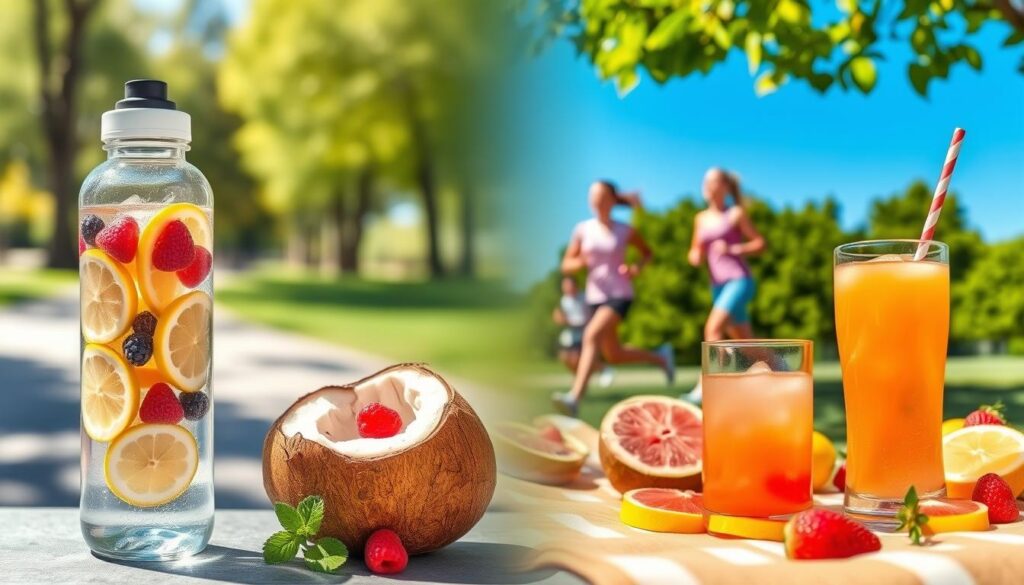
| Food | Water Content |
|---|---|
| Watermelon | 92% |
| Cucumbers | 96% |
| Strawberries | 91% |
Staying Hydrated During Workouts
Proper workout hydration is key for keeping your body performing well and avoiding dehydration. Dr. Eby suggests drinking 4 to 8 ounces of fluid every 15 to 20 minutes while exercising. You can use healthy drinks like water or sports drinks to stay hydrated.
A study found that 66% of professional soccer players start dehydrated, which hurts their performance. It’s important to have a hydration schedule to avoid this. Here are some tips to keep you hydrated during workouts:
- Drink 17 to 20 ounces of water 2 to 3 hours before starting to exercise.
- Consume 8 ounces of water 20 to 30 minutes before starting exercise.
- Recommended intake during exercise is 7 to 10 ounces of water every 10 to 20 minutes.
Sports nutrition is also crucial for staying hydrated during exercise. Carbohydrates help your body absorb fluids quickly. Electrolyte beverages can help restore fluid balance and give you energy. Dietary hydration is important too, as it helps your body absorb nutrients and stay hydrated.
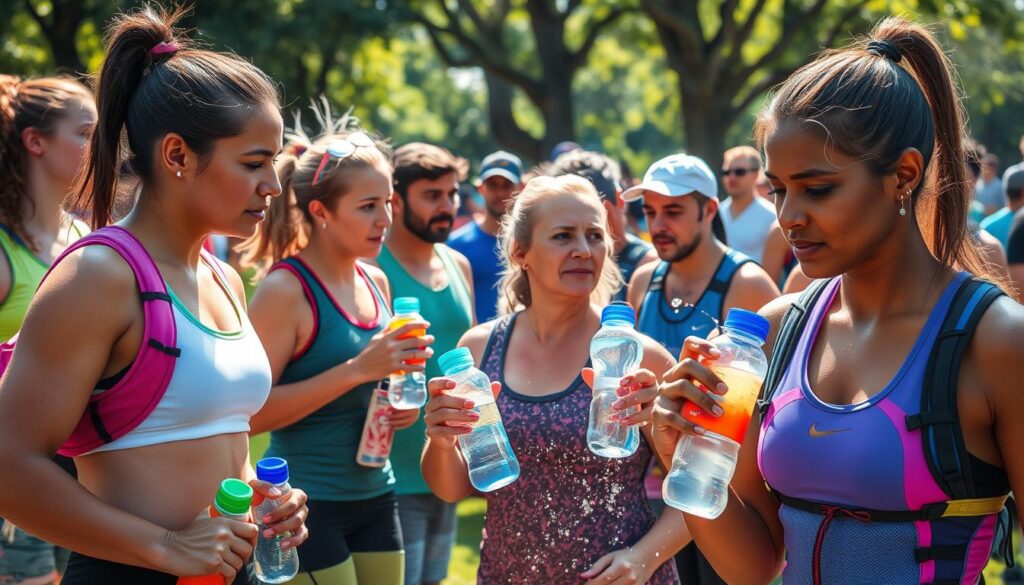
Always listen to your body and drink when you feel thirsty. Dehydration signs include dizziness, nausea, and muscle cramps. If you feel these symptoms, stop exercising and drink water or a sports drink to rehydrate.
| Fluid Intake | Timing |
|---|---|
| 17-20 ounces | 2-3 hours before exercise |
| 8 ounces | 20-30 minutes before exercise |
| 7-10 ounces | every 10-20 minutes during exercise |
Post-Exercise Recovery Strategies
After a workout, it’s key to focus on recovery. Your body needs to refill energy, fix muscles, and rehydrate. Drinking enough water after exercise is vital. It helps avoid muscle cramps, fatigue, headaches, and poor performance.
Dr. Eby suggests drinking 3 cups of water for every pound lost during exercise. This helps with hydration and weight loss. Staying hydrated also supports the body’s natural functions and health.
Rehydrating After Intense Activity
It’s crucial to rehydrate after intense workouts. You need to replace lost fluids and electrolytes. Drinking water or sports drinks with electrolytes can help. Also, watch your urine output to adjust your hydration.
Best Snacks for Recovery
Choosing the right snacks after a workout is important. They help with recovery. Here are some great options:
- Bananas, which are rich in potassium
- Nuts and seeds, which are high in healthy fats and protein
- Dried fruits, which are rich in antioxidants and fiber
These snacks help refill energy, repair muscles, and support hydration challenges.
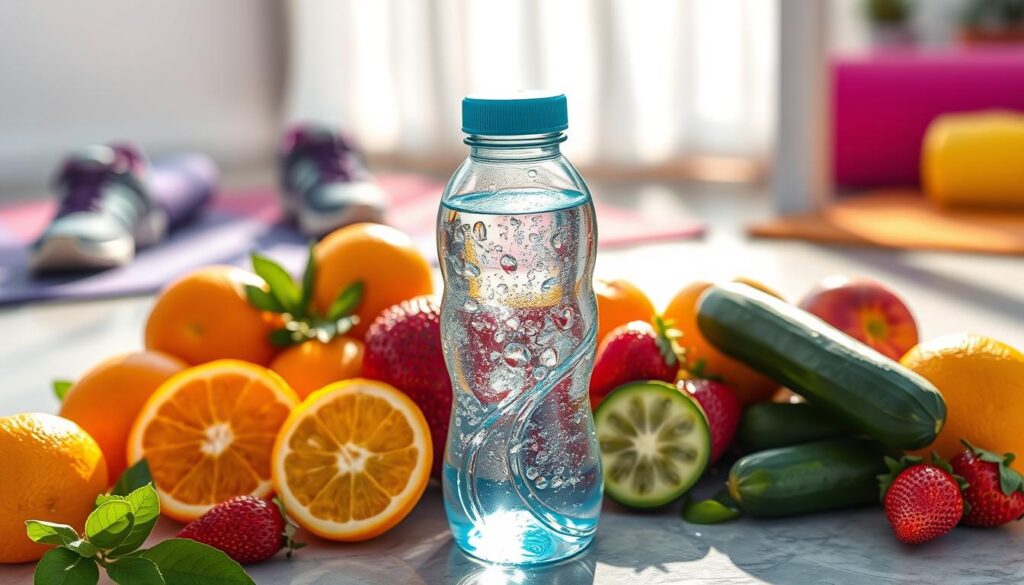
By using these recovery strategies, you can help your body recover from hard workouts. You’ll stay hydrated and support your overall health and wellness.
| Recovery Strategy | Importance |
|---|---|
| Rehydrating after intense activity | Replaces lost fluids and electrolytes |
| Consuming snacks for recovery | Replenishes energy stores and repairs muscles |
How to Incorporate Hydration into Your Routine
It’s key to have good hydration routines for health and performance. Dr. Eby says to follow a hydration plan daily and use reminders to drink water. This is very important for those who work out a lot, as it helps with performance and recovery.
Having a good plan for drinking water can also help meet daily needs. The Institute of Medicine suggests that adult women need about 91 ounces of fluid daily. Adult men need about 125 ounces. Athletes might need even more to replace lost water and salts. Sports nutrition is crucial here, as it gives the needed nutrients and water for athletes.
Setting Water Reminders
Setting water reminders is a simple yet effective way to stay hydrated. You can use a mobile app or a physical reminder like a sticky note on your fridge. This helps ensure you drink enough water, even when you’re busy or distracted.
Using Apps for Hydration Tracking
Apps for tracking hydration can also be very helpful. They can track your water intake, remind you to drink, and give personalized advice. Using these apps can help you develop good hydration habits and improve your health and performance.
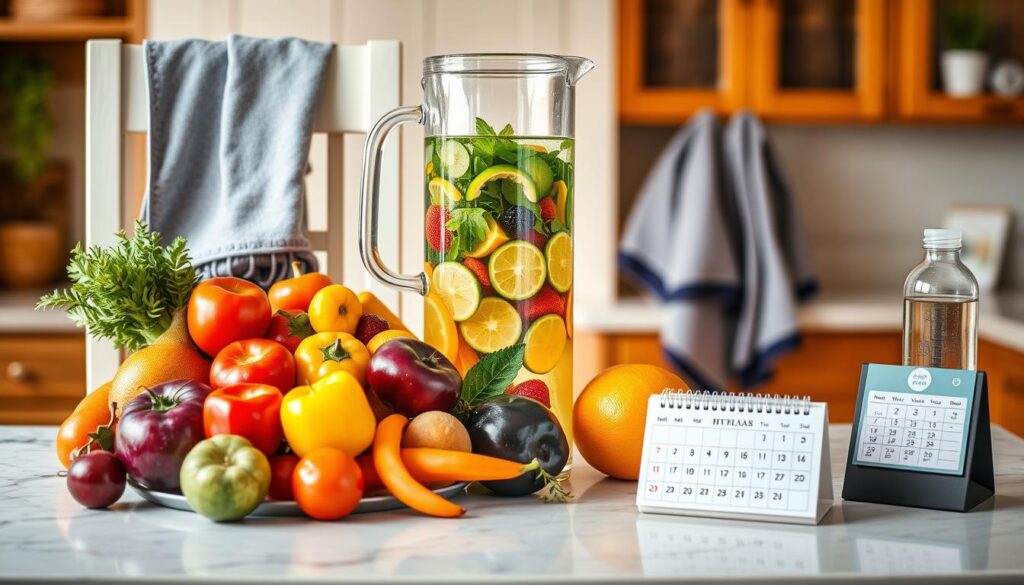
Adding hydration to your daily routine can boost your health and performance. Whether you work out regularly or just want to stay hydrated, reminders and apps can help. They’re effective ways to meet your daily water needs.
Hydrating Foods to Include in Your Diet
Staying hydrated is key for our bodies to work right. Eating foods rich in water can help a lot. Fruits and veggies are top choices, with some having up to 96% water.
Cucumbers, iceberg lettuce, and celery are great for adding to your meals. They’re full of water and good for you.
Other foods like tomatoes, cantaloupe, and watermelon are also hydrating. They’re packed with nutrients like fiber, vitamins, and minerals. Strawberries, for example, are 92% water and full of fiber and vitamin C. They’re perfect for hot summer days.
Fruits and Vegetables High in Water
- Watermelon: 92% water content
- Cantaloupe: 90% water content
- Strawberries: 92% water content
- Cucumbers: 96% water content
- Iceberg lettuce: 96% water content
Eating these water-rich foods helps with nutrient absorption and keeps you hydrated. Simple changes in your diet can keep you healthy. So, add these hydrating foods to your meals and snacks.
The Role of Weather in Hydration
The weather greatly affects hydration and health. How much water you need depends on the climate, how hard you exercise, and for how long. In hot weather, you lose more water through sweat, so you need to drink more water.
In cold weather, you might lose less water, but it’s still important to stay hydrated. This helps you keep up with active living habits.
In extreme weather, you need to adjust your hydration for workouts carefully. For example, in hot and humid weather, athletes should drink more to replace lost salts. In cold weather, it takes longer for your body to adjust, so you should drink more slowly.
Here are some tips for staying hydrated in different weather conditions:
- In hot weather, drink at least 8-10 cups of water per day
- In cold weather, aim for 6-8 cups of water per day
- Monitor urine color to ensure proper hydration – clear to pale yellow indicates good hydration

By understanding how weather affects hydration, you can keep your body properly hydrated. This supports active living and hydration for workouts.
| Weather Condition | Fluid Intake Recommendation |
|---|---|
| Hot and Humid | 8-10 cups per day |
| Cold | 6-8 cups per day |
Tips for Hydration on the Go
Staying hydrated when you’re traveling or away from home can be tough. But, with the right strategies, it can become easy. Using a water bottle is a great way to track how much water you drink. It also reminds you to drink more.
Adding practical tips like drinking water at set times and eating hydrating foods can help a lot. These habits support your hydration and health.
For nutrition hacks to stay hydrated, consider a few things. Eating snacks with lots of water, like fruits and veggies, boosts your water intake. Also, choose drinks with less sugar and caffeine to help meet your hydration goals.
Easy Travel Hydration Solutions
- Bring a refillable water bottle
- Pack hydrating snacks, such as fruits and vegetables
- Avoid sugary and caffeinated drinks
Staying Hydrated at Work or School
At work or school, having access to clean water is key. Use a water bottle or a hydration app to track your water intake. These practical tips and nutrition hacks help keep you hydrated, even when you’re busy.
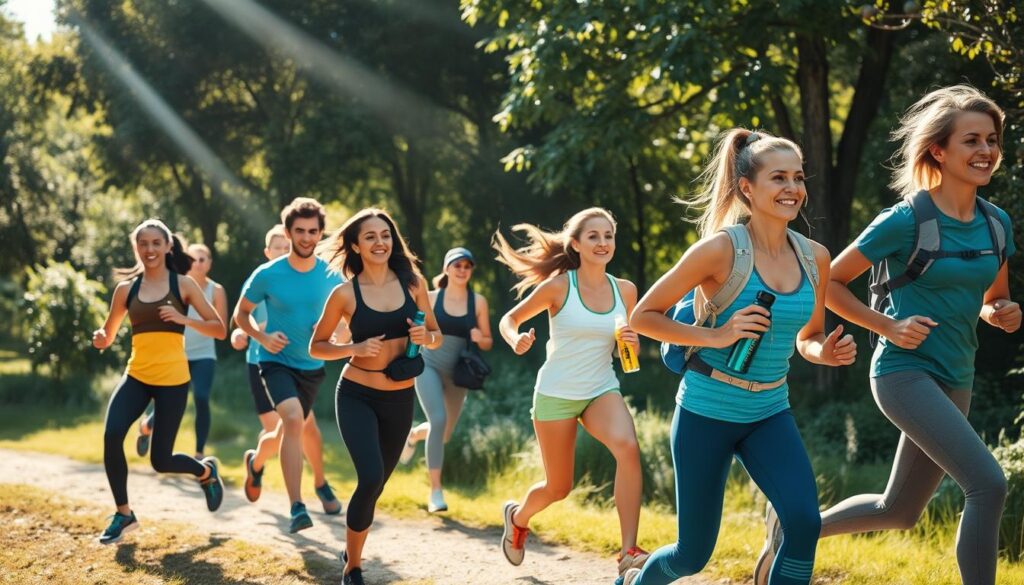
| Hydration Tips | Benefits |
|---|---|
| Drink water regularly | Supports overall health and hydration |
| Eat hydrating foods | Contributes to daily water consumption |
| Avoid sugary drinks | Supports hydration goals and overall health |
Myths and Facts About Hydration
There are many wrong ideas about staying hydrated. Dr. Eby, a top sports nutrition expert, clears up these myths. He gives advice based on science to help keep active people well-hydrated.
Separating Fact from Fiction
The “8 glasses of water a day” myth is common. But, the U.S. National Academies suggest 92-124 ounces of water for adults. This can change based on age, how active you are, and where you live.
Also, studies show coffee and tea don’t really make you lose water. Drinking them in moderation doesn’t hurt your hydration.
Hydration Strategies That Work
Sports drinks can help during hard workouts or in hot weather. Eating foods with lots of water, like fruits and veggies, also helps. But, don’t rely on urine color to check if you’re hydrated. Thirst is a better sign.
Knowing the truth about hydration helps active people stay healthy and perform better. Talking to a sports nutrition expert can help you meet your hydration needs.





















